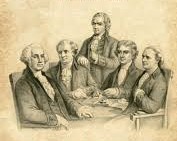The first 77 of these essays were published serially in the Independent Journal, the New York Packet, and The Daily Advertiser between October 1787 and April 1788. A compilation of these 77 essays and eight others were published in two volumes as The Federalist: A Collection of Essays, Written in Favor of the New Constitution, as Agreed upon by the Federal Convention, September 17, 1787 by publishing firm J. & A. McLean in March and May 1788. The last eight papers (Nos. 78–85) were republished in the New York newspapers between June 14 and August 16, 1788.
Federalist No. 10 is generally regarded as the most important of the 85 articles from a philosophical perspective. In it, Madison discusses the means of preventing rule by majority faction and advocates a large, commercial republic.
This is complemented by Federalist No. 14, in which Madison takes the measure of the United States, declares it appropriate for an extended republic, and concludes with a memorable defense of the constitutional and political creativity of the Federal Convention.
In Federalist No. 84, Hamilton makes the case that there is no need to amend the Constitution by adding a Bill of Rights, insisting that the various provisions in the proposed Constitution protecting liberty amount to a "bill of rights".
Federalist No. 78, also written by Hamilton, lays the groundwork for the doctrine of judicial review by federal courts of federal legislation or executive acts.
Federalist No. 70 presents Hamilton's case for a one-man chief executive.
In Federalist No. 39, Madison presents the clearest exposition of what has come to be called "Federalism".
In Federalist No. 51, Madison distills arguments for checks and balances in an essay often quoted for its justification of government as "the greatest of all reflections on human nature."
According to historian Richard B. Morris, the essays that make up The Federalist Papers are an "incomparable exposition of the Constitution, a classic in political science unsurpassed in both breadth and depth by the product of any later American writer."
HOWEVER... there are some legal minds that believe that our US Constitution is no longer indicative of the American People and the future of our country. That the US Constitution should no longer reflect the intent of our Founding Fathers 200 years ago but should reflect the changing culture of today's AMERICA...
Which school of thought is CORRECT?


No comments:
Post a Comment